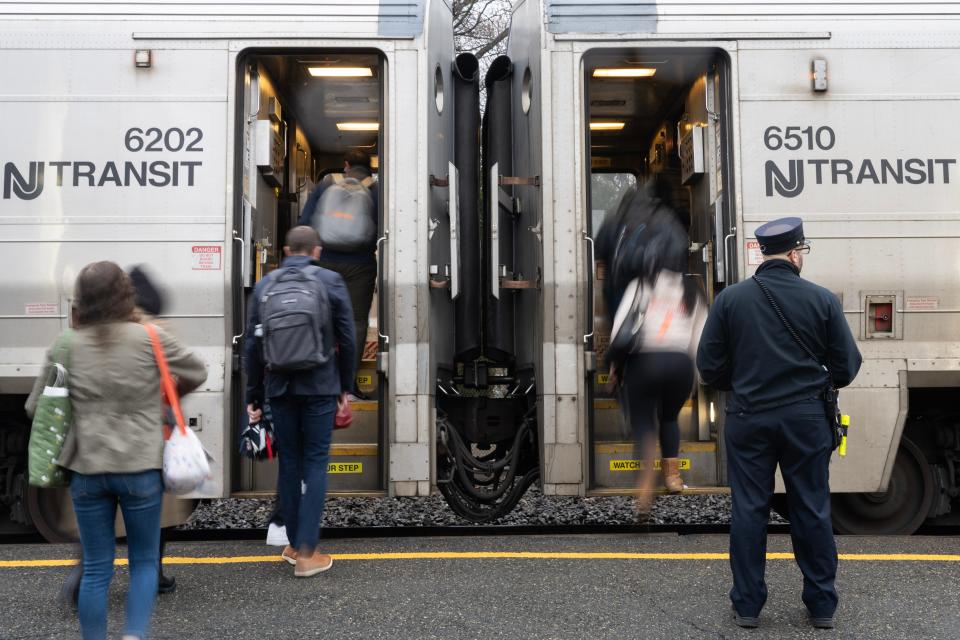Gov. Phil Murphy’s corporate tax to fund NJ Transit should be derailed
Trenton lawmakers are considering a new tax on the backs of businesses to fund NJ Transit. Gov. Phil Murphy proposed a corporate transit tax when he delivered his budget address in February, and now it is up to our Legislature whether this tax becomes a reality. Representing some of the largest employers in North Jersey and South Jersey, our members are vigorously opposed to the governor’s plan.
The proposed tax aims to raise $1 billion a year to fund NJ Transit from over 500 of the state’s largest employers. It’s a wrongheaded proposal, and we urge our lawmakers to reject this approach to funding NJ Transit because it will only dissuade new investment in our state and further add to the cost of doing business, making our state less competitive.
NJ businesses must not be seen as a piggy bank
Businesses cannot continue to be the piggy bank whenever revenues must be raised, especially when there is little benefit provided to the businesses, their employees and their customers. There is a limit to what businesses can pay, and New Jersey should do more to encourage new investment in the state. This tax proposal does the opposite. Let’s keep in mind that NJ Transit is used daily by only 1 in 10 New Jersey residents. Daily car commuters driving to their jobs in the state would be punished by this subsidy, as there is little doubt employment data will prove that this tax would hurt the state’s job market. What’s more, this proposed tax puts New Jersey and its larger employers at a competitive disadvantage not only with states like North Carolina, South Carolina, Georgia and Florida that attract businesses from our state but with our next-door neighbors. It makes no sense.
It seems the Murphy administration does not have the recognition that our neighboring states of New York and Pennsylvania continue to lower their corporate business taxes to attract new businesses. Pennsylvania’s corporate business tax is slated to be lowered to 4.99% by 2031, and New York’s tax is 7.99%. With the additional 2.5% transit tax, New Jersey’s corporate tax rate will be 11.5%, making it the highest in the nation. As it is, our state is currently the fourth-highest in the nation. Let’s not make it easier for our neighboring states to convince New Jersey employers to expand there by further burdening our employers. Again, it is up to our legislative leadership to push back here.

The pressures on our businesses to remain viable in a global economy continue to increase year over year. Whether it is retaining a talented and skilled workforce, dealing with supply chain issues or keeping up with changes in technology, the challenges are imposing and real. New Jersey must do all it can to place a “welcome mat” outside our door that invites new investment into our state. Remember, it all trickles down. New Jersey consumers are going to feel this. And at a time when we are facing inflation at the rate we are, it’s not the time to be doing any kind of increase in tax on businesses across the board.
NJ Transit is nearly $1 billion short. Taxing corporations like Amazon, Tesla could fix that.
We need more business to come to New Jersey
Our goal should always be to bring new businesses in and retain the ones that are here. When you consider that the top three sources of tax revenues (most of the income tax and sales tax and the corporate business tax) all have one common denominator — private sector jobs — it is counterintuitive to implement policies that will shrink those sources of revenue.
New Jersey residents and businesses pay more than their fair share in federal taxes, and that is why we need to lobby Washington to send more of that money back to our state to help with our transportation needs. The governor cannot use New Jersey’s largest employers to bankroll NJ Transit ridership, especially when it is used by so few state residents. Simply put, the corporate transit tax should be derailed.
Christina Renna is president and CEO of the Chamber of Commerce Southern New Jersey. Anthony Russo is president of the Commerce and Industry Association of New Jersey, based in Rochelle Park.
This article originally appeared on NorthJersey.com: New Jersey corporate transit fee is an unfair burden for businesses
